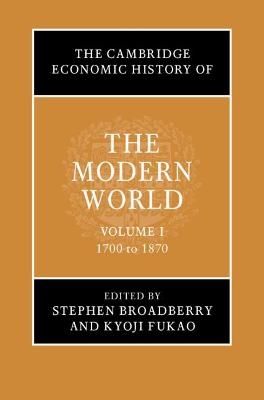
The Cambridge Economic History of the Modern World: Volume 1, 1700 to 1870
Cambridge University Press (Verlag)
978-1-107-15945-7 (ISBN)
The first volume of The Cambridge Economic History of the Modern World traces the emergence of modern economic growth in eighteenth century Britain and its spread across the globe. Focusing on the period from 1700 to 1870, a team of leading experts in economic history offer a series of regional studies from around the world, as well as thematic analyses of key factors governing the differential outcomes in different parts of the global economy. Topics covered include population and human development, capital and technology, geography and institutions, living standards and inequality, international flows of trade and labour, the international monetary system, and war and empire.
Stephen Broadberry is Professor of Economic History at the University of Oxford and a Fellow of the British Academy. He has been Managing Editor of the Economic History Review and also the European Review of Economic History and President of the Economic History Society and the European Historical Economics Society. Kyoji Fukao is President of the Institute of Developing Economies, Japan External Trade Organization (IDE-JETRO) and Specially Appointed Professor at the Institute of Economic Research, Hitotsubashi University. He has been President of the Asian Historical Economics Society and has published widely on Japanese and global economic history.
Introduction to Volume I Stephen Broadberry and Kyoji Fukao; Part I. Regional Developments: 1. Britain, the industrial revolution and modern economic growth Stephen Broadberry; 2. Continental Europe Giovanni Federico and Andrei Markevich; 3. Tokugawa Japan and the foundations of modern economic growth in Asia Masaki Nakabayashi; 4. China: the start of the great divergence Christopher Isett; 5. From the Mughals to the Raj: India 1700–1858 Anand V. Swamy; 6. Sustainable development in South East Asia Jean-Pascal Bassino; 7. The Ottoman Empire, 1700–1870 Şevket Pamuk; 8. The economic history of North America, 1700–1870 Joshua L. Rosenbloom; 9. Latin America: 1700–1870 Regina Grafe; 10. Africa: slavery and the world economy, 1700–1870 Patrick Manning; 11. Australia: geography and institutions David Meredith; Part II. Factors Governing Differential Outcomes in the Global Economy: 12. Population and human development since 1700 Osamu Saito and Romola Davenport; 13. Proximate sources of growth: capital and technology, 1700–1870 Alessandro Nuvolari and Masayuki Tanimoto; 14. Underlying sources of growth: first and second nature geography Paul Caruana-Galizia, Tomoko Hashino and Max-Stephan Schulze; 15. Institutions John Joseph Wallis; 16. Consequences of growth: living standards, inequality and consumption Jan Luiten van Zanden, Bas van Leeuwen and Yi Xu; 17. International transactions: real trade and factor flows Wolfgang Keller, Markus Lampe and Carol H. Shiue; 18. Monetary systems and the global balance of payments adjustment in the pre-gold standard period, 1700–1870 Rui Esteves and Pilar Nogues-Marco; 19. War and empire, 1700–1870 Philip T. Hoffman and Tirthankar Roy.
| Erscheinungsdatum | 28.06.2021 |
|---|---|
| Reihe/Serie | The Cambridge Economic History of the Modern World |
| Verlagsort | Cambridge |
| Sprache | englisch |
| Maße | 157 x 235 mm |
| Gewicht | 910 g |
| Themenwelt | Geisteswissenschaften ► Geschichte ► Allgemeine Geschichte |
| Geschichte ► Teilgebiete der Geschichte ► Wirtschaftsgeschichte | |
| Wirtschaft ► Volkswirtschaftslehre | |
| ISBN-10 | 1-107-15945-8 / 1107159458 |
| ISBN-13 | 978-1-107-15945-7 / 9781107159457 |
| Zustand | Neuware |
| Haben Sie eine Frage zum Produkt? |
aus dem Bereich


